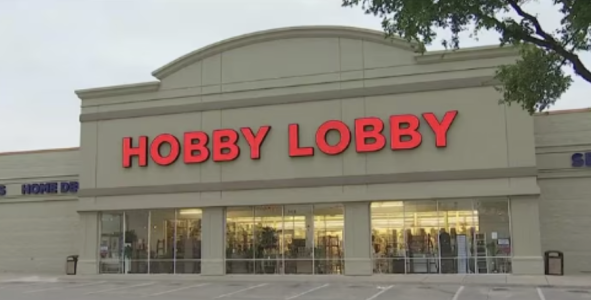Locals are drawing the line—why one store’s arrival has sparked boycott threats before it even opens
- Replies 0
One of the nation’s most recognizable retailers is moving into a prominent spot in a major city.
But instead of ribbon-cuttings and welcome signs, locals are calling for boycotts.
The controversy isn’t about pricing or products—it’s about values.
Here’s what’s fueling the backlash and what it says about the changing face of American retail.
Hobby Lobby is preparing to open its first-ever store in New York City—but the announcement has already drawn criticism.
The new store will take over a 75,000-square-foot space in TriBeCa, formerly home to Bed Bath & Beyond and Barnes & Noble.

Set to open at 270 Greenwich Street this spring, the location would be the retailer’s fifth in the state.
But many locals say the chain’s ideological reputation makes it unwelcome in the heart of such a diverse, progressive community.
Hobby Lobby has built a reputation not just as a craft store—but as a company led by evangelical Christian values.
Its stores are closed on Sundays and feature Christian-themed merchandise, from Bible verse decor to faith-centered books.
The brand’s motto is “honoring the Lord in all we do by operating the company in a manner consistent with biblical principles,” and that foundation has made headlines in the past.
In 2014, the company made national news after it successfully argued before the US Supreme Court that it could refuse to cover certain forms of contraception in employee health plans due to religious objections.
The company has also faced backlash for its ties to organizations that oppose LGBTQ+ rights, prompting ongoing criticism from civil rights groups and progressive shoppers.
Community members in TriBeCa are not staying quiet.
Artist Heide Fasnacht, a longtime resident, told The New York Times: “I moved to New York to get away from things like that.”
She has called for a boycott of the new store, a message that has echoed across local forums and neighborhood boards.
Madeline Lanciani, who owns a nearby pastry shop, added: “I will gladly go out of my way to shop somewhere else.”
The growing frustration reflects more than just store preferences—it’s about a perceived mismatch of values between the company and the community.
While its arrival in NYC is contentious, Hobby Lobby’s business is booming.
The company operates over 1,040 stores across the US and reported $8 billion in revenue in 2024. It added 37 new locations in the past year alone.
And while visits to competitors like Joann and Michaels have dropped by 5% and 9% respectively since 2019, Hobby Lobby saw a 17% increase during the same period, according to Placer.ai.
This success comes even as Joann recently announced plans to close around 800 locations following pandemic-era struggles.
Read more:

But instead of ribbon-cuttings and welcome signs, locals are calling for boycotts.
The controversy isn’t about pricing or products—it’s about values.
Here’s what’s fueling the backlash and what it says about the changing face of American retail.
Hobby Lobby is preparing to open its first-ever store in New York City—but the announcement has already drawn criticism.
The new store will take over a 75,000-square-foot space in TriBeCa, formerly home to Bed Bath & Beyond and Barnes & Noble.

Hobby Lobby is preparing to open its first-ever store in New York City. Image source: WGRZ-TV / YouTube
Set to open at 270 Greenwich Street this spring, the location would be the retailer’s fifth in the state.
But many locals say the chain’s ideological reputation makes it unwelcome in the heart of such a diverse, progressive community.
Hobby Lobby has built a reputation not just as a craft store—but as a company led by evangelical Christian values.
Its stores are closed on Sundays and feature Christian-themed merchandise, from Bible verse decor to faith-centered books.
The brand’s motto is “honoring the Lord in all we do by operating the company in a manner consistent with biblical principles,” and that foundation has made headlines in the past.
In 2014, the company made national news after it successfully argued before the US Supreme Court that it could refuse to cover certain forms of contraception in employee health plans due to religious objections.
The company has also faced backlash for its ties to organizations that oppose LGBTQ+ rights, prompting ongoing criticism from civil rights groups and progressive shoppers.
Community members in TriBeCa are not staying quiet.
Artist Heide Fasnacht, a longtime resident, told The New York Times: “I moved to New York to get away from things like that.”
She has called for a boycott of the new store, a message that has echoed across local forums and neighborhood boards.
Madeline Lanciani, who owns a nearby pastry shop, added: “I will gladly go out of my way to shop somewhere else.”
The growing frustration reflects more than just store preferences—it’s about a perceived mismatch of values between the company and the community.
While its arrival in NYC is contentious, Hobby Lobby’s business is booming.
The company operates over 1,040 stores across the US and reported $8 billion in revenue in 2024. It added 37 new locations in the past year alone.
And while visits to competitors like Joann and Michaels have dropped by 5% and 9% respectively since 2019, Hobby Lobby saw a 17% increase during the same period, according to Placer.ai.
This success comes even as Joann recently announced plans to close around 800 locations following pandemic-era struggles.
Read more:
- You might be surprised which stores are on the boycott radar next—here’s why
- Boycott begins at Target amid concerns over rising checkout costs
Key Takeaways
- Hobby Lobby is opening its first-ever New York City location in TriBeCa this spring.
- The company is known for its Christian-centered mission and controversial stances on contraception and LGBTQ+ issues.
- Local residents and small business owners have called for a boycott, citing ideological conflicts.
- Despite the pushback, Hobby Lobby’s business is growing—with $8 billion in revenue and 37 new stores added in 2024.
Do you think where we shop should reflect what we believe? Have you ever boycotted a store—or supported one—based on its values? Share your thoughts in the comments. Let’s talk about how personal principles and everyday purchases intersect.






